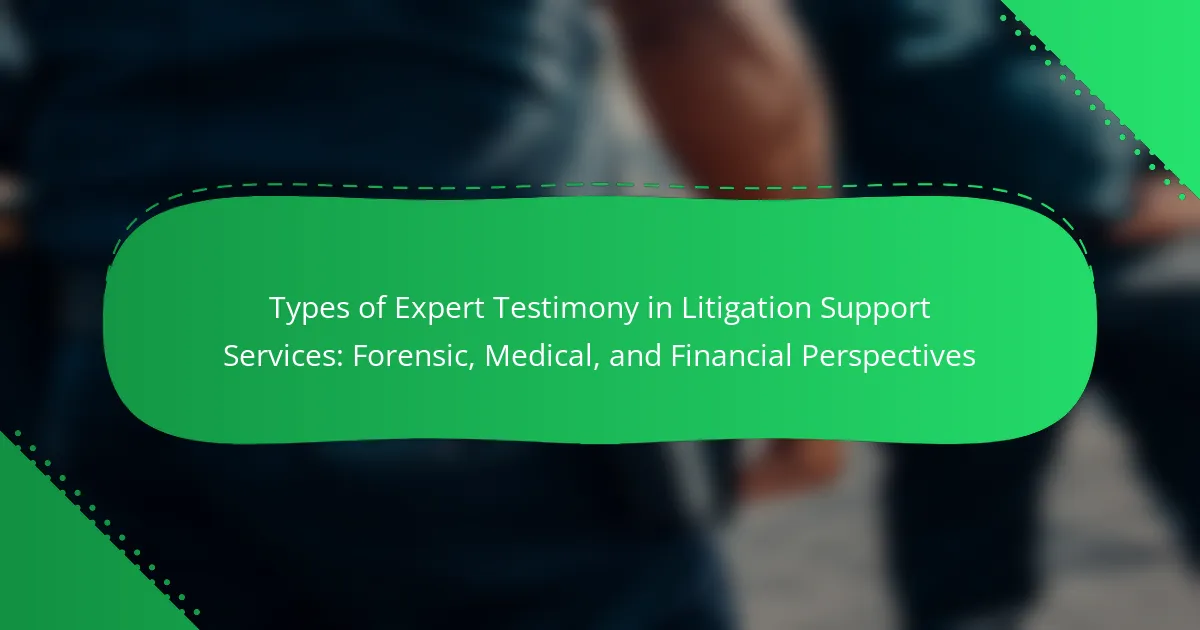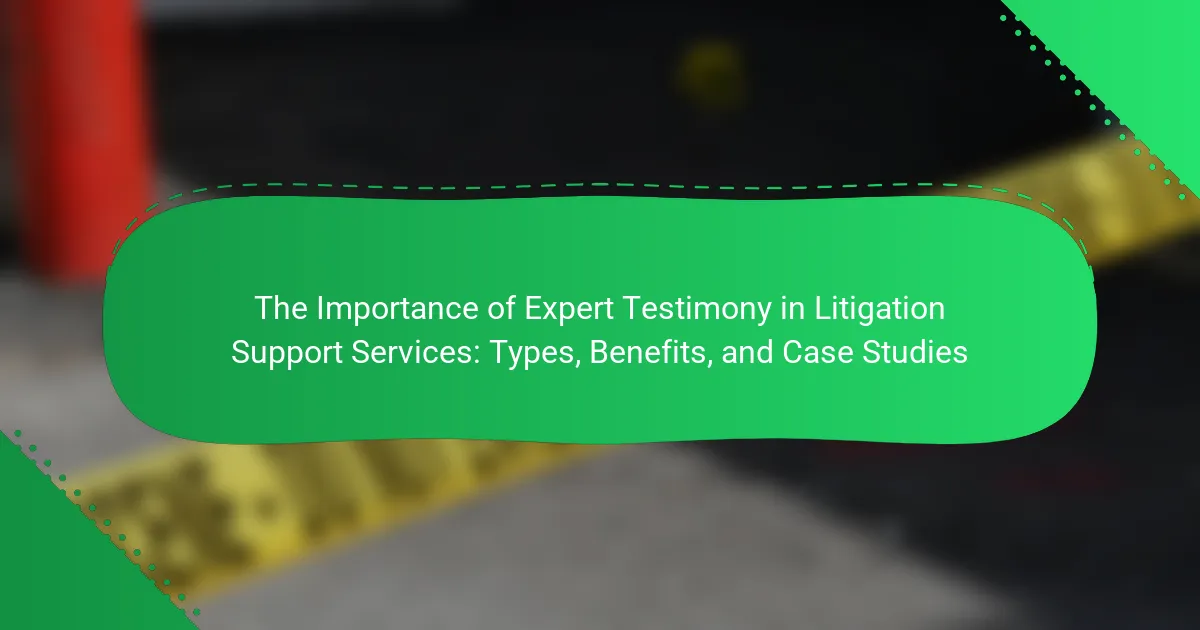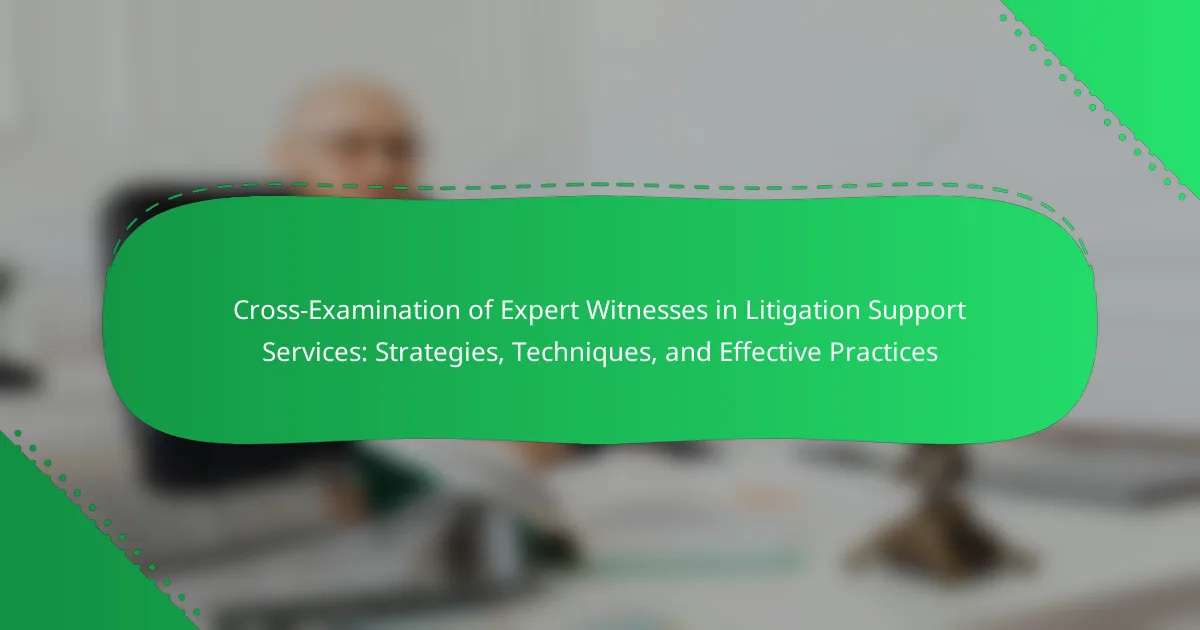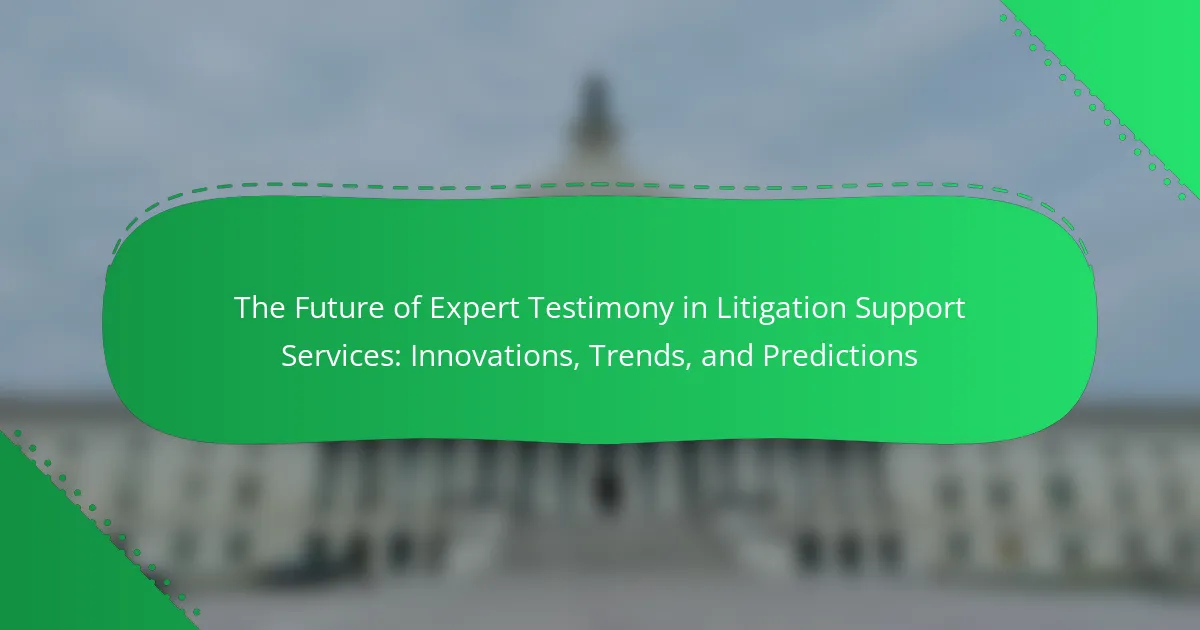Expert testimony in litigation support services encompasses three primary types: forensic, medical, and financial perspectives. Forensic testimony applies scientific principles to evidence analysis, medical testimony addresses health-related issues, and financial testimony evaluates economic aspects of cases. Each type plays a critical role in clarifying complex information for the court, with forensic experts analyzing physical evidence, medical experts assessing injuries, and financial experts determining economic damages. The interaction among these expert testimonies enhances the credibility of the evidence presented, supporting informed decision-making in legal proceedings. Best practices for utilizing expert testimony include selecting qualified experts, ensuring relevant credentials, thorough preparation, clear communication, and maintaining ethical standards.
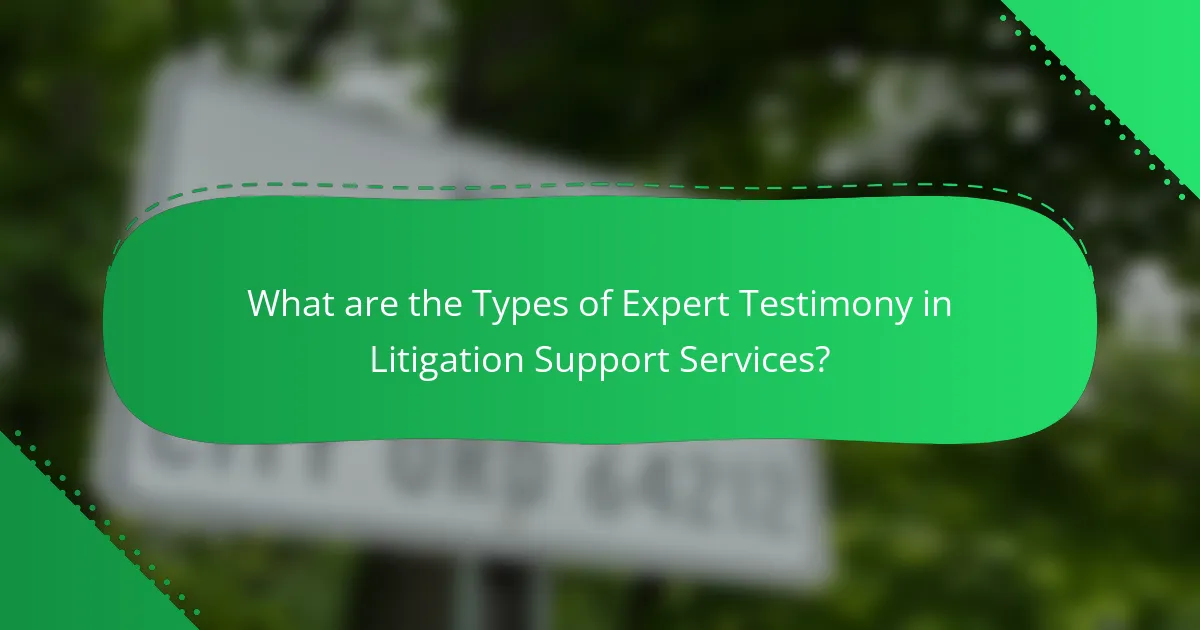
What are the Types of Expert Testimony in Litigation Support Services?
The types of expert testimony in litigation support services include forensic, medical, and financial perspectives. Forensic testimony involves the application of scientific principles to analyze evidence in legal cases. Medical testimony focuses on health-related issues, often provided by healthcare professionals. Financial testimony addresses economic aspects, typically delivered by financial analysts or accountants. Each type serves a specific role in helping the court understand complex information. Forensic experts may provide insights on crime scene analysis. Medical experts often clarify the implications of injuries or medical conditions. Financial experts assess damages and economic impact. These testimonies are crucial for informed decision-making in legal proceedings.
How do Forensic Experts contribute to Litigation Support?
Forensic experts contribute to litigation support by providing specialized knowledge and analysis. They assist in the examination of evidence related to legal cases. Their expertise helps in interpreting complex data and presenting findings in a comprehensible manner. Forensic experts often prepare reports that summarize their findings. These reports can be crucial in legal proceedings. They may also provide expert testimony in court to explain their analyses. Their involvement can significantly influence the outcome of a case. The credibility of forensic experts is often based on their education, experience, and adherence to scientific methods.
What specific roles do Forensic Experts play in legal cases?
Forensic experts play crucial roles in legal cases by providing specialized knowledge and analysis. They assist in the investigation of crimes by examining physical evidence. This includes analyzing fingerprints, blood samples, and digital data. Forensic experts also prepare detailed reports that summarize their findings. Their expertise is often presented in court as expert testimony. They help clarify complex scientific concepts for judges and juries. This aids in understanding the evidence’s relevance to the case. Forensic experts contribute to establishing facts that can influence trial outcomes. Their work ensures that evidence is handled and interpreted correctly, maintaining its integrity in legal proceedings.
How is Forensic Expert testimony prepared and presented?
Forensic expert testimony is prepared by conducting thorough investigations and analyses of evidence. Experts gather relevant data and apply scientific methods to interpret findings. They compile their results into detailed reports that outline methodologies and conclusions. The testimony is then presented in court to explain complex concepts clearly. Experts often use visual aids to enhance understanding. They must remain impartial and focus on factual information. Preparation includes anticipating cross-examination questions and practicing responses. This structured approach ensures clarity and credibility in legal proceedings.
What is the role of Medical Experts in Litigation Support?
Medical experts provide specialized knowledge in litigation support. They evaluate medical evidence related to cases. Their assessments help clarify issues such as injury causation and treatment necessity. Medical experts often prepare reports and may testify in court. Their testimony aids judges and juries in understanding complex medical information. They ensure that medical standards and practices are accurately represented. Medical experts are critical in personal injury, malpractice, and workers’ compensation cases. Their expertise significantly influences case outcomes and legal strategies.
What types of cases require Medical Expert testimony?
Medical expert testimony is required in various types of cases. These include personal injury cases, where the extent of injuries must be established. Medical malpractice cases also necessitate expert testimony to determine if the standard of care was met. In criminal cases, medical experts may provide insights into injuries related to violence or trauma. Workers’ compensation cases often require medical testimony to assess work-related injuries. Additionally, cases involving product liability may need medical experts to discuss the health impacts of defective products. Each of these cases relies on medical expertise to clarify complex medical issues for the court.
How do Medical Experts evaluate and report on injuries or health issues?
Medical experts evaluate and report on injuries or health issues through systematic assessment and documentation. They begin by conducting thorough physical examinations. This may include reviewing medical history and relevant imaging studies. Experts often use standardized assessment tools to quantify the severity of injuries. They may also perform diagnostic tests to gather objective data. After evaluation, they compile findings into detailed reports. These reports typically include diagnosis, prognosis, and treatment recommendations. Medical experts must ensure that their evaluations are evidence-based and adhere to clinical guidelines. This approach ensures accuracy and reliability in their testimony.
What are the Financial Perspectives of Expert Testimony?
Financial perspectives of expert testimony focus on the economic implications and valuation aspects in legal cases. Expert witnesses often assess financial damages, loss of earnings, and economic impact. They provide insights on financial records and projections. Their evaluations help determine compensation amounts in litigation. Courts rely on their expertise to establish financial credibility. Accurate financial testimony can significantly influence case outcomes. Studies show that effective expert testimony can increase settlement amounts. Financial experts are crucial in complex litigation, especially in business disputes.
How do Financial Experts assess economic damages in litigation?
Financial experts assess economic damages in litigation by analyzing financial data and projecting future earnings. They begin by reviewing relevant documents, such as tax returns, financial statements, and business records. This analysis helps to establish baseline financial performance. Experts then consider factors like market conditions and industry standards to evaluate potential losses. They may also use economic models to quantify damages. These models can include discounted cash flow analysis or comparable sales methods. Financial experts often prepare detailed reports to present their findings. Their assessments are crucial in determining compensation amounts in legal disputes.
What methodologies do Financial Experts use in their analysis?
Financial experts use various methodologies in their analysis, including quantitative analysis, qualitative analysis, and comparative analysis. Quantitative analysis involves statistical techniques and financial modeling to assess numerical data. This methodology helps in evaluating investment performance and risk. Qualitative analysis focuses on non-numerical factors, such as market trends and management effectiveness. It provides insights into a company’s operational health. Comparative analysis benchmarks financial metrics against industry standards or competitors. This methodology highlights relative performance and market positioning. Together, these methodologies offer a comprehensive understanding of financial situations and support informed decision-making.
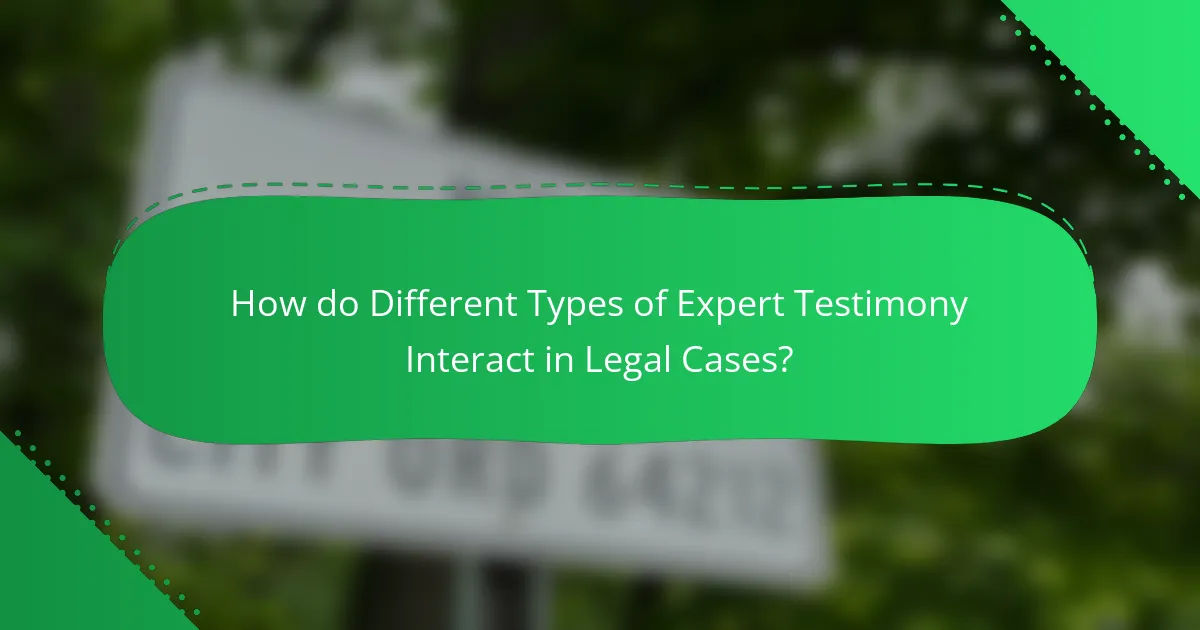
How do Different Types of Expert Testimony Interact in Legal Cases?
Different types of expert testimony interact in legal cases by providing complementary perspectives. Forensic experts analyze physical evidence, while medical experts assess injuries or health impacts. Financial experts evaluate economic damages or financial implications. Each type of testimony can support or challenge claims made by others. For instance, a forensic expert’s findings may influence a medical expert’s assessment of injury severity. This interaction helps establish a comprehensive understanding of the case. Courts rely on these diverse insights to make informed decisions. The interplay among expert testimonies enhances the credibility and robustness of the evidence presented.
What is the importance of collaboration among Forensic, Medical, and Financial Experts?
Collaboration among forensic, medical, and financial experts is crucial for effective litigation support. This teamwork enhances the accuracy of findings and conclusions. Forensic experts provide technical analysis and evidence. Medical experts contribute insights into health-related issues and implications. Financial experts analyze economic impacts and financial records. Together, they create a comprehensive view of the case. This multidisciplinary approach leads to more informed decisions. Research shows that integrated expert testimony increases the credibility of evidence presented in court. Effective collaboration can significantly influence case outcomes.
How can the integration of multiple expert testimonies strengthen a case?
The integration of multiple expert testimonies can significantly strengthen a case by providing corroborative evidence. This approach enhances the credibility of the information presented. Each expert brings specialized knowledge that can address different aspects of the case. For instance, a forensic expert may analyze physical evidence, while a medical expert can provide insights into injuries. The combination of these perspectives offers a comprehensive view of the situation. Furthermore, when experts agree on key points, it reinforces the case’s arguments. Studies have shown that juries are more likely to be persuaded by consistent expert opinions. This integration creates a more robust narrative, making it harder for opposing parties to refute the claims.

What Best Practices Should Be Followed in Utilizing Expert Testimony?
Best practices in utilizing expert testimony include selecting qualified experts, ensuring their credentials are relevant, and preparing them thoroughly. Qualified experts possess specialized knowledge in their field. Their relevance to the case enhances credibility. Thorough preparation involves reviewing case materials and practicing testimony delivery. Clear communication of complex information is essential. Experts should avoid jargon to ensure understanding. Engaging in mock examinations can help identify weaknesses. Finally, maintaining ethical standards is crucial. Ethical experts uphold integrity and avoid conflicts of interest. These practices collectively strengthen the effectiveness of expert testimony in litigation.
How can legal professionals effectively select and engage Expert Witnesses?
Legal professionals can effectively select and engage expert witnesses by following a structured approach. First, they should identify the specific area of expertise required for the case. This involves understanding the case’s context and the type of testimony needed. Next, legal professionals should conduct thorough research to find qualified candidates. They can utilize professional networks, databases, and referrals from trusted sources.
After identifying potential experts, legal professionals should evaluate their qualifications. This includes reviewing their education, experience, and prior testimony. It is essential to assess their communication skills, as effective testimony requires clarity and confidence. Additionally, legal professionals should conduct interviews to gauge the expert’s suitability for the case.
Once a suitable expert is selected, legal professionals must engage them effectively. This involves clearly outlining the expectations, scope of work, and compensation. Establishing a collaborative relationship is crucial for successful testimony. Regular communication throughout the process ensures that the expert is well-prepared.
Research shows that effective engagement of expert witnesses can significantly impact case outcomes. A study by the National Center for State Courts found that well-prepared expert testimony improves juror understanding and case credibility. Thus, following these steps enhances the likelihood of favorable results in litigation.
What criteria should be considered when choosing an Expert Witness?
When choosing an expert witness, consider their qualifications and experience in the relevant field. The expert should possess advanced degrees or certifications that validate their expertise. Previous experience as an expert witness is crucial, as it indicates familiarity with legal proceedings. Additionally, assess their ability to communicate complex concepts clearly. This ensures their testimony is understandable to a jury or judge. Evaluate their reputation within the industry, as a respected expert is more likely to be credible. Finally, consider their availability and willingness to commit to the case timeline. These criteria are essential for effective expert testimony in litigation support services.
How can attorneys prepare Expert Witnesses for testimony?
Attorneys can prepare expert witnesses for testimony by conducting thorough pre-trial interviews. These interviews help clarify the expert’s opinions and ensure they understand the case details. Attorneys should review relevant documents with the expert to align their testimony with the case strategy. Mock trials or depositions can be effective for practicing testimony delivery. This practice helps experts become familiar with courtroom procedures and questioning styles. Attorneys should also discuss potential cross-examination questions to prepare the expert for challenges. Clear communication about the expert’s role and the importance of their testimony is crucial. This preparation enhances the expert’s confidence and effectiveness during the actual testimony.
What common pitfalls should be avoided when using Expert Testimony?
Common pitfalls to avoid when using expert testimony include failing to verify the expert’s qualifications. It is crucial to ensure that the expert has relevant experience and credentials in the specific field. Relying on outdated information can also undermine the testimony’s credibility. Expert opinions must be based on the latest research and data. Additionally, presenting overly complex jargon can confuse the jury. Clear and concise communication is essential for effective testimony. Ignoring the opposing expert’s perspective can weaken the argument. Acknowledging and addressing counterarguments demonstrates thoroughness. Lastly, not preparing the expert for cross-examination can lead to vulnerabilities. Proper preparation helps the expert defend their opinions effectively.
How can legal teams ensure the credibility of Expert Testimony?
Legal teams can ensure the credibility of expert testimony by thoroughly vetting the qualifications of the expert. This includes reviewing their education, credentials, and relevant experience in the field. Legal teams should also assess the expert’s past testimony and publications to evaluate their expertise. Engaging in a detailed interview with the expert can clarify their methodologies and opinions. Additionally, legal teams should confirm that the expert’s opinions are based on reliable principles and methods. Utilizing peer-reviewed studies or established standards in the expert’s field can further validate their testimony. Courts often consider these factors when determining the admissibility of expert testimony, as seen in the Daubert standard.
What strategies can help in managing conflicting Expert opinions?
Establishing clear communication is essential in managing conflicting expert opinions. This involves setting a structured framework for discussion among experts. Facilitating open dialogue allows experts to express their viewpoints and clarify misunderstandings. Utilizing a neutral mediator can help in guiding the conversation and ensuring all voices are heard.
Encouraging collaboration among experts fosters a shared understanding of the issues at hand. This can lead to consensus-building through compromise or synthesis of differing opinions. Documenting each expert’s input is crucial for reference and accountability.
Incorporating evidence-based research strengthens the validity of opinions presented. This approach relies on data and facts to support claims, reducing subjective biases. Reviewing case studies where conflicting opinions were successfully managed provides practical insights.
Ultimately, these strategies create a conducive environment for resolving differences and enhancing the decision-making process.
The main entity of the article is “Types of Expert Testimony in Litigation Support Services,” focusing on forensic, medical, and financial perspectives. The article outlines the distinct roles and contributions of each type of expert testimony in legal cases, highlighting how forensic experts analyze evidence, medical experts assess health-related issues, and financial experts evaluate economic impacts. It discusses the preparation, presentation, and methodologies used by these experts, as well as the importance of collaboration among them to enhance case credibility. Additionally, best practices for selecting and preparing expert witnesses are provided to ensure effective testimony in litigation.
